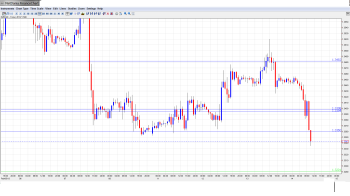EUR/USD dropped sharply after disappointing GDP data from the Eurozone. Germany, France, Italy and the Eurozone all posted larger than expected declines in their economies, underscoring continued weakness in the bloc’s major economies. The Eurozone GDP fared no better, and also posted a sharp decline. In the US, today’s highlight is Unemployment Claims.
EUR/USD Technical
- Asian session: Euro/dollar was lower as the pair dipped below the 1.34 line, touching a low of 1.3385. EUR/USD consolidated at 1.3391. The pair has dropped sharply in the European session.
- Current range: 1.3290 to 1.3360.
Further levels in both directions:
- Below: 1.3290, 1.3255 , 1.3170, 1.3130, 1.3110, 1.3030, 1.30 and 1.2960.
- Above: 1.3360, 1.34, 1.3480, 1.3588, 1.3690, 1.3740, 1.3860, 1.3915 and 1.40.
- 1.3290 is providing support, as EUR/USD is dropping.
- 1.3360 is the next line of resistance.
Euro/dollar slumps after weak Euro GDP data – click on the graph to enlarge.
EUR/USD Fundamentals
- 6:30 French Preliminary GDP. Exp. -0.2.%. Actual -0.3%.
- 7:00 German Preliminary GDP. Exp. -0.5%. Actual -0.6%.
- 7:45 French Preliminary Non-Farm Payrolls. Exp. -0.2.%. Actual -0.2%.
- 9:00 Eurozone ECB Monthly Bulletin.
- 9:00 Italian Preliminary GDP. Exp. -0.5.%. Actual -0.9%.
- 10:00 Eurozone Flash GDP. Exp. -0.4%. Actual -0.6%.
- 13:30 US Unemployment Claims. Exp. 361K.
- 15:30 US FOMC Member Daniel Tarullo Speaks.
- 15:30 US Natural Gas Storage. Exp. -166B.
- 17:50 US FOMC Member James Bullard Speaks.
- 18:00 US 30-year Bond Auction.
For more events and lines, see the Euro to dollar forecast
EUR/USD Sentiment
- Euro down after weak GDP numbers: The euro has taken a tumble, losing close to a cent in Thursday’s European session. The currency took a hit after GDP releases out of the major eurozone economies were very weak. Germany, France and Italy all recorded declines, and all three readings were below the market estimate. The news was no better from the eurozone economy, which also posted a sharp drop in its GDP. The markets are particularly concerned about economic weakness in Germany, which, as the largest economy in the Eurozone, is the key to the Eurozone getting back on its feet. Senior European officials, including ECB chief Mario Draghi have said that the bloc will not see improvement until late in 2013, but will the markets show the same patience and optimism? If Eurozone releases continue to disappoint, we can expect the euro to lose more ground.
- Draghi upbeat on Spain: ECB head Mario Draghi paid a visit to Spain on Tuesday, and addressed the Spanish Parliament in Madrid. Draghi had warm words for his hosts, declaring that “Spain is on the right track”. He was upbeat about the Spanish banking sector, stating that the country’s banks have recovered and are now able to provide credit. Draghi dismissed the idea of establishing an exchange rate policy to keep the euro from rising too rapidly, saying that it was “inappropriate” for the ECB to aim for a particular target. He did, however, reiterate that the ECB is closely monitoring the recent fluctuations in the currency markets.
- G-7 warns against currency wars: The G20 meets in Moscow later this week, and an important topic on the agenda will be the issue of exchange rates. There is mounting concern about currency wars, as countries are increasingly relying on monetary policy to kick-start their flagging economies. The G-7, clearly concerned about the high-flying euro and sinking Japanese yen, reiterated its commitment to allowing the markets to determine exchange rates. The Institute of International Finance, which is comprised of leading banks and financial institutions, also weighed in on the matter. It urged the G-20 to take steps to avoid the “possible discord on exchange rates”. However, we’re unlikely to see any fireworks at the G-20 over this matter. Given the need to reach a consensus, analysts expect any statement on currencies from the G-20 to be mild in nature.
- EU Agrees to Budget Cuts: After marathon negotiations in Brussels, EU leaders reached a deal to cut the EU budget, for the first time in the bloc’s history. The seven-year budget is being trimmed from the current 994 billion euros to 960 billion. The cuts are modest in scale, but nonetheless an important step in reigning in spending. The deal is a hard-fought compromise, as it reduces the budget while providing more funds for agricultural aid. Although all EU leaders have signed off on the agreement, it must be approved by the European Parliament, which is by no means certain. European Parliament head Martin Schulz has already stated that the budget will not pass in its current format, so we could see further developments in this matter.

